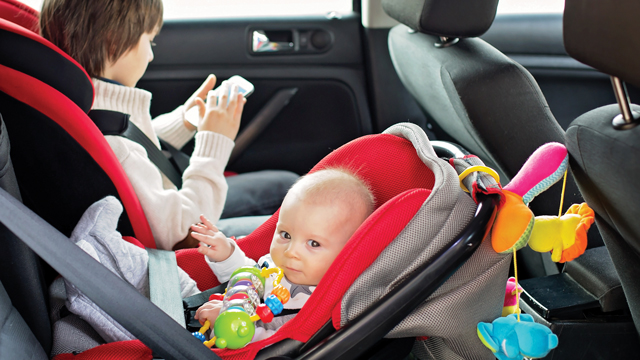Every parent wants to be able to see the precious face of her child when driving, yet switching car safety seats to the forward-facing position before a baby’s body is ready is dangerous. It is much better to rely on a backseat mirror to see your child’s sweet face than to risk injury, or worse, during a crash.
As of July 1, 2019, Virginia law requires that child safety seats remain rear-facing until the child is two years old or he reaches the minimum weight limit for a forward-facing child restraint device as indicated by the manufacturer of the device. The new law, established by House Bill 708 in 2018 and championed by Delegate Eileen Filler-Corn, will bring Virginia requirements in line with the safety recommendations of many national safety organizations including: AAA, American Academy of Pediatrics (AAP), National Highway Traffic Safety Administration, Insurance Institute for Highway Safety, Centers for Disease Control, Safe Kids Worldwide, and others.
The law is an important step in continuing efforts to keep children as safe as possible while traveling in a vehicle.
The Mid-Atlantic Foundation for Safety and Education (a charitable affiliate with AAA), along with many car seat manufacturers, recommends keeping children rear-facing until they are at least two years old – or even longer – depending on the child’s size. Ultimately, children are safest when kept rear-facing in a car seat.
Instead of focusing on a toddler’s minimum weight before he can face forward in a car seat, parents and caregivers should keep children rear-facing until they reach the maximum weight limit of a convertible car seat, which has a higher rear-facing weight and height limit than an infant seat. While infant car seats with handles can be convenient, convertible seats transition from rear-facing to forward-facing, which means families can typically use a convertible car seat for their baby from birth through the booster stage.
Getting Serious About Safety
A violation of the rear-facing requirement will be the same as existing penalties. First violations are subject to a civil penalty of $50, and second or subsequent offenses on different dates are subject to a civil penalty of up to $500. In Virginia, all civil penalties collected for these violations are paid into a special fund which is used to promote, purchase, and distribute child restraint devices to families who need a child restraint device but are unable to afford one.
Under the current law, there are exceptions to the requirement if a doctor determines that the use of a child restraint system is impractical for size, physical unfitness, or other medical reasons. If a parent is driving with a child in the car who has been granted this exemption, he or she must carry a signed written statement from a physician at all times.
Keeping Kids Safe in Cars is a Priority
There are reasons that many trusted names in child safety – including Safe Kids and the AAP – recommended the change in the positioning of car seats. Here are three:
• Rear-facing seats disperse the crash force more evenly across the back of the seat and the child’s body and limit the motion of the head, reducing the potential of neck injury.
• Children are about 75 percent less likely to die or sustain serious injury in a rear-facing seat.
• Young children’s bones, ligaments, and joints are still developing, which places infants and toddlers at an increased risk of head and spinal cord injury in the event of a collision. Rear-facing seats can reduce this risk by supporting a baby’s relatively large head and preventing it from moving independently from his proportionately smaller neck.
The good news for families is nearly all convertible child safety car seats on the market as of 2017 could accommodate children up to forty pounds or more when used rear-facing. That’s a weight that exceeds the ninety-fifth percentile for children at two years of age. When shopping for baby gear (or looking for a perfect gift), you might want to consider a convertible car seat so your child can stay safe in a rear-facing car seat for as long as possible.




